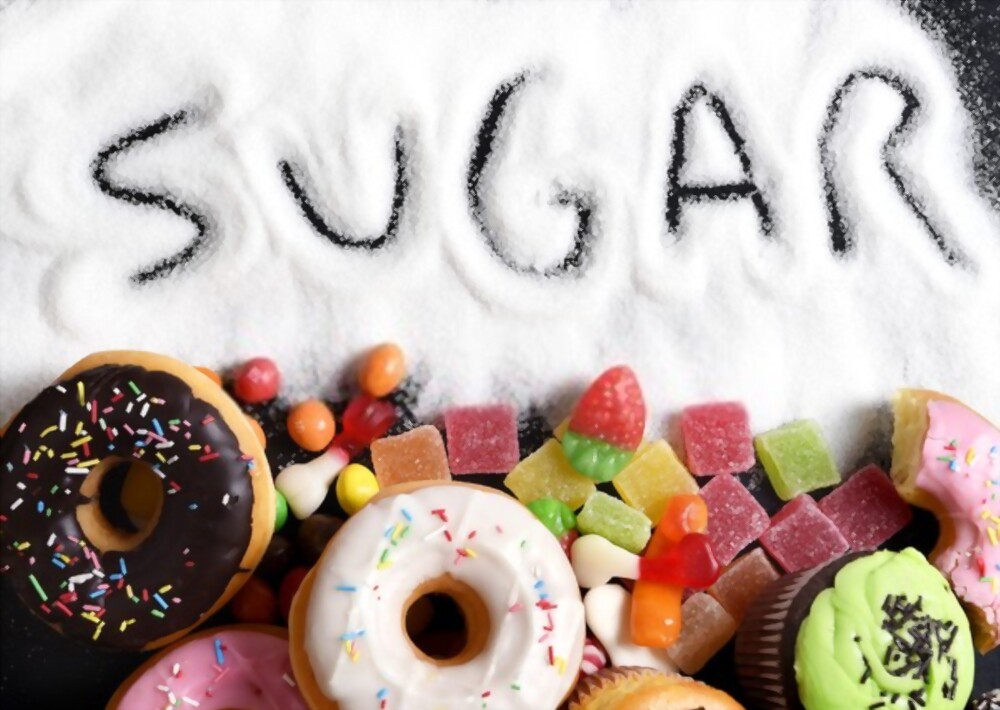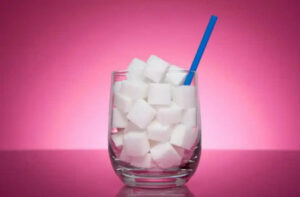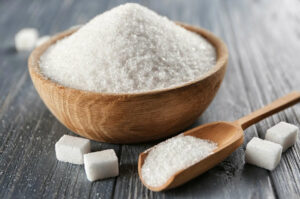
In 1700, the average American consumed about 4 pounds of sugar per year. That’s approximately a teaspoon per day. Today, because of the enormous amounts of sweeteners hidden in processed foods, the average American eats 180 pounds of sugar per year! That’s half a pound, or 48 teaspoons per day!
In 1890, 3.5% of white males in their fifties were obese and there were less than 3 cases of diabetes per 100,000 people. In 1975, the obesity rate across the board was 15% of the population. Today, 32% of the population is obese, another third is overweight, and there are 8,000 cases of diabetes per 100,000 people and climbing.
If this trend continues, 1 out of 3 people will be diabetic by the year 2050.
When you read over the list below and see the sugar content in common, every day foods, you’ll understand how easily we reach that 48 teaspoons of sugar per day and even surpass it.
How To Estimate Sugar Content in Food
 To estimate the sugar content of a food item in teaspoons, find the “total carbohydrates” on the nutrition label, and then look at the fiber.
To estimate the sugar content of a food item in teaspoons, find the “total carbohydrates” on the nutrition label, and then look at the fiber.
If the fiber content is higher than 5 grams (it won’t be for most processed foods), subtract the fiber value from the total carbohydrates and divide that number by 4.
For example, if your cereal contains 40 grams of total carbohydrates (per serving) and 8 grams of fiber, then 40 – 8 = 32.
Then divide 32 by 4 which equals 8 teaspoons of sugar.
If the fiber content is less than 5 grams, do not subtract it. Simply divide total carbohydrates by 4.
Pay close attention to serving sizes as food manufacturers sometimes manipulate them to hide high amounts of toxic ingredients. For instance, a single-serving cup of yogurt might actually be marked as 2 servings, effectively doubling the sugar content values on the label.
Imagine spooning sugar into your kid’s mouth in the quantities listed below. Prepare to be shocked.
*tsp values are approximate and have been rounded to the closest whole number. Nutritional content of different brands varies slightly.
Drinks
1. Coca Cola:
- Can (12 oz) = 10 tsp
- Bottle (20 oz) = 16 tsp
- Bottle (1 liter) = 27 tsp
- Big Gulp (28 oz) = 23 tsp
- Super Gulp (38 oz) = 32 tsp
2. Mountain Dew:
- Bottle (20 oz) = 19 tsp
- Bottle (1 liter) = 31 tsp
3. Rock Star Energy Drink – 1 Can (8 oz) = 8 tsp
4. Red Bull – 1 Can (8 oz ) = 7 tsp
5. Vitamin Water:
- Bottle (8 oz) = 3 tsp
- Bottle (20 oz) = 8 tsp
6. Sobe Water:
- Bottle (8 oz) = 7 tsp
- Bottle (20 oz) = 18 tsp
7. Arizona Ice Tea:
- Bottle (8 oz) = 6 tsp
- Bottle (20 oz) = 18 tsp
8. Snapple – 1 Bottle (8 oz) = 6 tsp
9. Minute Maid Orange Juice – 1 Bottle (8 oz) = 6 tsp
10. Capri Sun – 1 Pouch (6.5 oz) = 4.5 tsp
11. Starbucks Mocha Frappuccino (16 oz) = 12 tsp
12. Jamba Juice Mango (16 oz) = 7.5 tsp
13. Cherry Slurpee (28 oz) = 16 tsp
14. Coke Slurpee (40 oz) = 22.5 tsp
15. McDonald’s Chocolate Shake (Medium) = 28 tsp
Snacks
1. Chips:
- Triscuit Crackers (6 Crackers) = 5 tsp
- Wheat Thins (16 Crackers) = 5.5 tsp
- Potato Chips (1 oz) = 4 tsp
- Vegetable Chips (14 Chips) = 4 tsp
- Cheetos (21 Pieces) = 3 tsp
- Doritos – Nacho Cheese (14 Chips) = 4 tsp
- Regular Pretzels (10 Pretzels) = 12 tsp (SAY WHAT!)
- Microwave Popcorn (100 Calorie Mini-Bag) = 5.5 tsp
- Pudding Cup (1 Cup) = 4 tsp
- PowerBar (1 Bar) = 6 tsp
- Cliff Bar (1 Bar) = 5 tsp
- Twinkies (2 Pack) = 9 tsp
- White Bread (1 Slice) = 9 tsp (SAY WHAT!)
- Oreos (1 Serving/4 Cookies) = 3.5 tsp
- Fig Newtons (2 Cookies) = 3 tsp
- Graham Crackers (2 Sheets) = 2 tsp
2. Snickers:
- Regular Bar = 7.5 tsp
- King Size Bar = 13.5 tsp
- Reese’s PB Cups (1 Package) = 5 tsp
- Skittles (1 Bag) = 12 tsp
- Starburst (1 Package) = 8.5 tsp
“Health” Food (Yeah Right!)
1. Yoplait Yogurt (6 oz cup) = 7 tsp
2. Cereal:
- Whole Grain Cheerios (1 Cup) = 5 tsp
- Honey Nut Cheerios (3/4 Cup) = 5.5 tsp
- Whole Grain Total (3/4 Cup) = 4 tsp
- Whole Grain Fiber One (1 Cup) = 8.5 tsp
- Kashi Whole Grain Flakes (1 Cup) = 9 tsp
- Skim Milk (1 Cup) = 3 tsp
3. Snack Bars:
- Fiber One (1 Bar) = 3 tsp
- LaraBar (1 Bar) = 6.5 tsp
- Kind Bar (1 Bar) = 5.5 tsp
- V8 Vegetable Juice (9 oz) = 3 tsp
- V8 Splash Berry Blend (8 oz) = 4.5 tsp
- Bolthouse Farms Berry Boost Smoothie (8 oz) = 7.5 tsp
- Quaker Oats Oatmeal (1/2 Cup) = 6 tsp
- Whole Wheat Bread (1 Slice) = 3.5 tsp
- Chocolate Milk (1 Cup) = 6.5 tsp
- Bagel (1 Medium) = 12 tsp
4. Sauces:
- Ketchup (1 tbsp) = 1 tsp
- Tomato Sauce (1 Cup) = 4 tsp
- BBQ (1 tbsp) = 2 tsp
- Relish (1 tbsp) = 1 tsp
- Honey Mustard (1 tbsp) = 1 tsp
- Tartar Sauce (2 tbsp) = 1 tsp
- Cocktail Sauce (1 tbsp) = 1 tsp
5. Kid’s Food:
- Infant Formula (1 fl. oz) = 1 tsp
- Applesauce (1 Cup) = 11 tsp
- Mac-n-Cheese (1 Cup) = 12 tsp
- Pizza Rolls (6 Rolls) = 6 tsp
- Chicken McNuggets (4 Pieces) = 3 tsp
- McDonald’s Fries (100 Calorie Serving) = 3 tsp
- Grilled Cheese (1 Sandwich) = 6 tsp
- Fruit Roll-Up (1 Roll-Up) = 3 tsp
- Gushers (1 Pouch) = 5 tsp
 This is by no means an exhaustive list. It could go on forever.
This is by no means an exhaustive list. It could go on forever.
Please note that most of the items here aren’t even meals. They are the snacks, treats, and little munchies about which we like to say, “Everything in moderation.” Well, as you can see, these foods (even in moderation) quickly add up to toxic and devastating amounts of sugar.
A breakfast consisting of a plain bagel, a cup of yogurt, and a glass of orange juice is already 25 teaspoons of sugar to start your day.
Where can you possibly go from there? If the rest of your day consists of more processed carbohydrates and foods that come in a box, it will be nearly impossible to avoid disease over time.
It is imperative, for the health and longevity of our families, that we learn how to read labels. They’re confusing on purpose, but we can indeed protect ourselves using that information if we decipher it correctly.
If you want to sweeten things with a healthy sugar alternative, SweetLeaf makes a form of Stevia (from a plant) that is chemical-free. This brand is the only form of Stevia we recommend other than growing your own Stevia plant.

